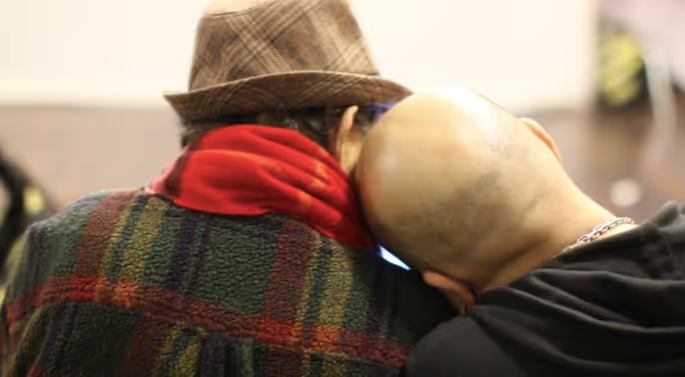Our Time Machine: Memory, Story, and Connection
Overview

In Our Time Machine,filmmakers S. Leo Chiang and Yang Sun follow Chinese artist, Maleonn’s (Ma Liang), attempt to honor his father’s memory – not his life, his actual memory. Ma Ke, himself an accomplished artist as longtime Peking Opera director, has not yet died, but has Alzheimer’s disease. Using art (his comfort zone), Maelonn is trying to preserve their father-son memories.
He creates “Papa’s Time Machine,” a magical, autobiographical stage performance featuring life-size mechanical puppets. The performance provides teachers and students an opportunity to consider the themes we relate to in autobiography, how it can help us to find and reflect on our own stories, and how we choose to tell our stories.
Students will use the stories that Maleonn chooses to tell as a springboard for telling their own autobiographical story, and in doing so, connecting their own life story to universal human themes.
A Note from Curriculum Creator, Dr. Faith Rogow
Adolescents commonly experience feelings that no one understands what they are experiencing. For some, that can lead to feelings of disconnection, isolation, and even alienation. Finding the universal themes in their own life stories can help them understand that they are, indeed, unique, but also connected. At a time when many people are pulling away from those who are different (racially, religiously, ethnically), finding the themes that are common to humanity can provide common ground, helping people better understand those they define as “other.” As an added benefit, recognizing the universal themes in their own stories can help students identify (and perhaps even connect with) themes in the literature they are assigned to read.
Subject Areas
● English/Language Arts
● Art
● Media Literacy
● Creative Writing
Grade Levels:[10-12]
Objectives:
In this lesson, students will:
● Understand the potential benefits of reading autobiographies
● Explore what makes a literary theme “universal”
● Tell their own parent-child story
● Identify the universal theme(s) in their own personal stories (and through that, see
their stories as valuable)
● Consider various options we have for sharing our stories: writing, oral, film, stage
performance, etc.
● [optional] Investigate how do some people’s stories come to be part of the literary
canon that we study in schools, while other people’s stories are left out
Materials:
● Film Clips from Our Time Machine and a way to screen them
Time Needed:
One 45-minute class period with homework and an option for students to share their work.
